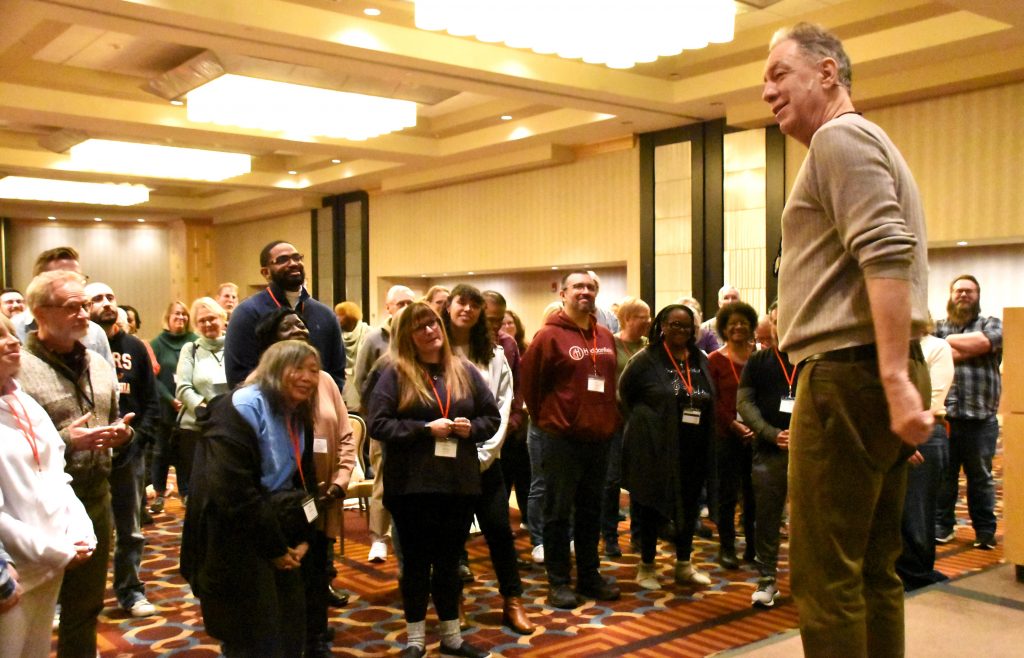Story is the language of human experience. Every time we tell a story we build community. —Mark Yaconelli
Offering coffee and conversation after Sunday worship, monthly Meals of Love, and affordable clothing and household items in its Blessed Treasures shop, Beverly (NJ) United Methodist Church is committed to doing community outreach. But now, thanks to the Greater New Jersey Conference’s Bridges Project, the two-century-old congregation is learning to also do what one might call inreach.
Members are learning to reach into the lives of others through the sharing of stories—personal, poignant, passionate and often powerful stories that can reveal the deep, inner dimensions of people’s lives—who they are, how they feel, what they need, and more.
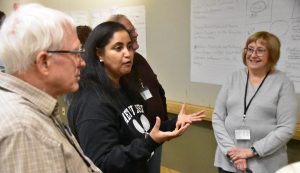
The Rev. Anna Thomas (center),
pastor of Beverly UMC, talks with her
Bridges second cohort team about how
to advance their church’s story-sharing
progress to more deeply engage the
community they serve. John Coleman photo
It might happen over a cup of coffee, a meal, a store transaction or an informal interview. But the small team of church leaders who attended their second Bridges training in February are trying to gather 50 or more personal stories told by fellow members and neighbors.
“Our introduction to Bridges last September was fascinating and beneficial to our personal growth and connections,” recalled the Rev. Anna Thomas, Beverly UMCs pastor, who immigrated to New Jersey from India. As her members learn to become vulnerably honest and share life experiences with one another, they are also learning to invite stories from their church’s visitors and neighbors.
That’s the humble but potentially impactful modus operandi of the Bridges Project: storytelling and story-listening to help congregations engage with the diversity of their surrounding communities. Stories are the little-known secret to deeply touching and possibly transforming people’s lives and relationships. And while Bridges is part of GNJ’s Journey of Hope initiative to end the sin of racism, it spans not just the deep currents of race and culture but other differences as well.
‘A culture of going beyond just serving people’
“It gave us a culture of going beyond just serving people, but also talking to them,” said Thomas. “The stories people share with us are like precious gems that teach and inspire us and bring more meaning to what we do.”
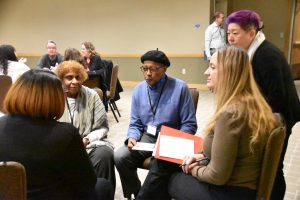
Phyllis Myung listens as the second-cohort team from Galilee UMC of
Englewood discusses approaches to welcoming, learning and responding to
the needs of their neighbors. John Coleman photo
Beverly’s and nine other church teams from around the conference make up Bridges’ second cohort in the three-year program funded by a $1 million Lilly Endowment grant in 2021. They met for their second gathering February 3-4 at the Heldrich Hotel in New Brunswick, and they will have one more gathering in May.
Until then, they will meet via Zoom with coaches and complete important assignments:
- to collect, share and learn from more stories while connecting with their neighbors;
- to grow their church’s participation in Bridges by fostering a culture of personal and communal story-sharing; and
- to share with members a new, thought-provoking game called Ripple Effects, created by Discipleship by Design, that can help them better understand compounding social problems in their communities and explore possible solutions.
The third and final Bridges cohort of 15 church teams simultaneously began their training in February, meeting mostly apart from the second cohort. They will have two more trainings, May 3-5 and August 23-25, in this final year of the program. A team of young facilitators from Ministry Architects provides training, coaching and consulting as partners assisting GNJ’s Bridges director Alyssa Ruch.
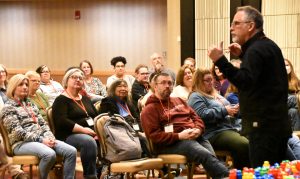
Mark Yaconelli, master storyteller, introduces Bridges’ third cohort to the art, craft and practice of storytelling and story-sharing.
John Coleman photo
“Storytelling is an act of hospitality…(and) and an enemy is merely someone whose story you don’t know,” said Mark Yaconelli, a master storyteller from Oregon, who founded The Hearth to teach “personal storytelling practices to help communities and individuals deepen relationships, address injustices, and cultivate compassion.”
In teaching the third cohort, he offered ample narrative wisdom and drew the same from participants by creating a safe space for small-group, reminiscent storytelling, individual story-writing and candid reflections.
Storytelling is ‘folk medicine’ for healing, restoration
Some described feeling vulnerable, honored, angry, compassionate, grateful, recognized, reconnected, unalone, liberated, more trusting and other reactions that they realized they could likewise inspire in others through the power of stories. Yaconelli likens storytelling to “folk medicine” that can provide profound healing and restoration.
David Gonzales, another proficient storyteller, poet and playwright also enlivened a two-hour plenary session with enlightening and at times emotional poetry and group story-sharing.
“Most of the things we have in common are the things we don’t share,” wrote one participant during the story-writing exercise, where participants’ honest, anonymous writings were taped to walls around the ballroom for all to read.
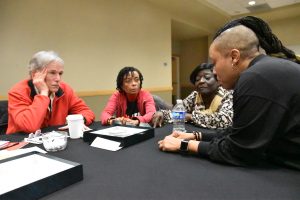
Aqeelah Ligonde helps a Bridges second-cohort
team from the UMC of New Brunswick work with the Ripple Effects game to
understand and address compounding social problems in their communities. John Coleman photo
“This exercise felt very sacred, almost like church,” said the Rev. Catherine Jordan-Latham, who serves in cross-racial appointments as the pastor of Broadway and Port Colden UM churches. “This whole experience was hard for a lot of us—the emotional sharing and committing to the time and travel to be here. So, it’s a privilege to hold (in our hearts) the words people felt the need to put on paper… What is not getting done in our relationship-building is because we can’t for a lot of reasons. But ultimately, this is about us trusting.”
“So many people in the room are from different backgrounds and experiences, but somehow this turned out to be what each person needed,” said Alyssa Ruch. “It’s a lot to plan logistically, but God shows up and it always ends up working out.”
Standing in a circle at the end, participants—who numbered nearly 120 in total—shared their takeaways from the experience: joy, gratitude, hope, possibilities, courage, new friends, the ability to listen and hear, and to speak and be heard. Asked what they would leave behind, they named: loneliness, doubt, worry, numbness, the act of “putting on a show.”
‘Our communities are going to change the church”
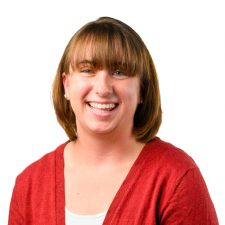
Alyssa Ruch
“Our communities are going to change the church,” said Ruch. “Our relationships and our connections matter, and the only way the church is going to grow and be effective is to build relationships with the community.”
The Bridges Project training is free, funded by the Lilly grant. “It’s a gift to the congregations that we work with because it allows all our congregations to participate without financial burdens or implications,” said Ruch.
Moreover, “it is designed “to address cultural competency by developing and practicing skills for deep empathy,” she explained. “Our churches are given skills to notice ‘the other’ within their communities; but rather than judge, they are able to approach others with a sense of deep curiosity and to learn how the church can be a friend and partner.
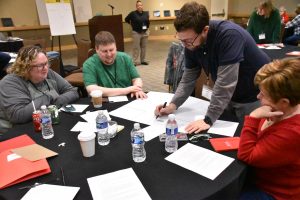
The Rev. Wil Wilson (standing) helps his second cohort team from First UMC Williamstown journal their progress.
John Coleman photo
“It is not the traditional anti-racism work, but our congregations are getting curious about the people who don’t look like them in their communities and how we can be connected to the felt needs of the community.”
Visit the Bridges section of GNJ’s website to learn more. And view the short videos where 2023 cohort participants reflect on their learning experiences with storytelling and how it impacted them.
Ruch is recruiting a few extra participants who want to participate in the May 3-5 Bridges training to help them connect their communities through story-sharing. Contact her at aruch@gnjumc.org.
Some content for this story was provided by writer Krista B. Jefferies.

